Advertisement
From Yo-Yo Ma To Madeleine Albright, New Tanglewood Learning Institute Brings Masters To The Masses
Resume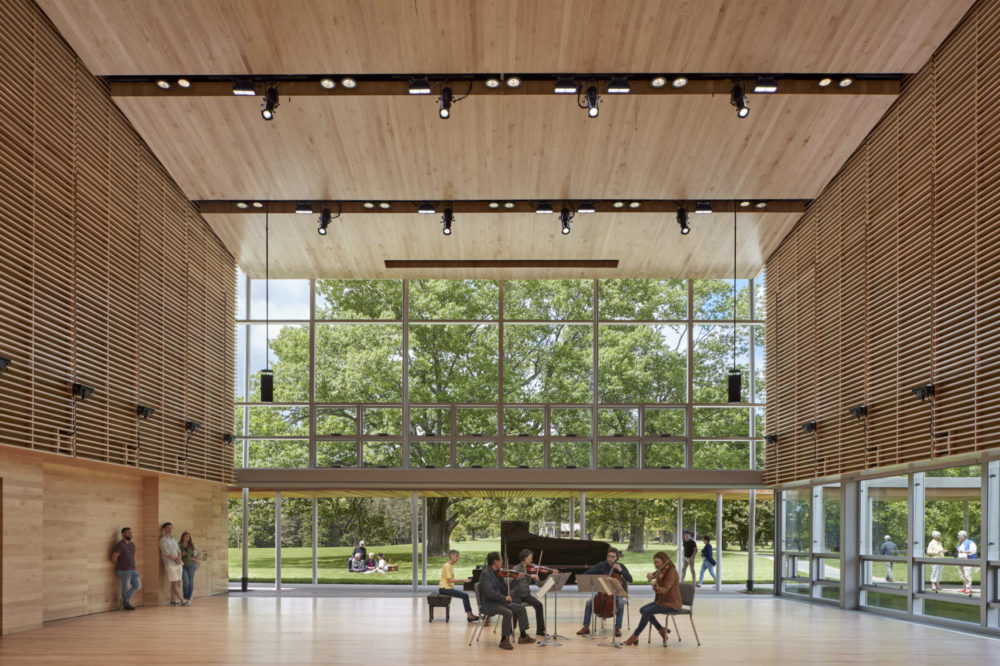
Tanglewood, the summer home in the Berkshires of the Boston Symphony Orchestra, has long felt like something of a summer camp for musicians and fans. Since 1936, music lovers have noshed and lounged on blankets at Tanglewood while listening to the BSO play hits by Brahms or Beethoven. (These days lawn tickets cost a modest $13.)
Less visible are the hours of intense instruction for about 150 young musicians at the Tanglewood Music Center.
Aspiring music fellows spend weeks on campus perfecting their craft with top-tier professionals. The sounds of their honing float through the woods as you walk on gravel paths past 1940s-era practice studios and Seiji Ozawa Hall. Built 25 years ago, the stately performance venue was, until now, Tanglewood’s last major building project.
“If you don't evolve, you expire,” is how BSO president and CEO Mark Volpe explained this milestone moment. After years of strategic planning — and a $70-million capital campaign — he said the new Linde Center for Music and Learning gives students additional space to practice and perform that’s desperately needed. (“We had high school rehearsals at night,” Volpe said.)
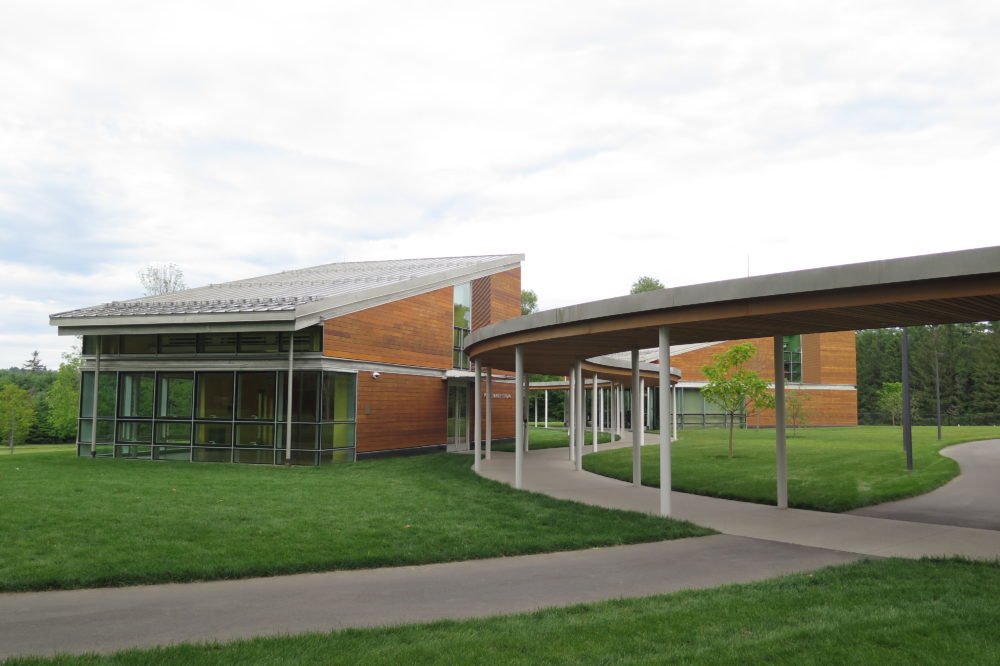
But the center's four wood-and-glass buildings also act as a hub for an adult education initiative dubbed the Tanglewood Learning Institute, or TLI.
“People are very curious,” Volpe said. With generations of people who haven’t had the advantage of music education in school, he sees a hunger for deeper discussion and a pulling back of the curtain — especially among retirees who have time and money. Volpe points to another summer pastime with a chatty, passionate fan base.
“Look at the Red Sox,” he said with a laugh. “They own a TV network, they have, you know, 10 hours of talk about the game before the game even happens.”
Through TLI, Volpe said classical enthusiasts can engage more intimately with master instrument makers, composers, vocalists and players, including cellist Yo-Yo Ma.
“How we prepare, how we coach, how we mentor,” Volpe elaborated.
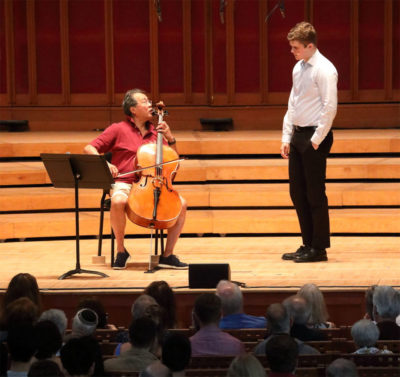
People lined up outside Ozawa Hall to witness Ma in action with three Tanglewood fellows. Many in the crowd were musicians themselves, both professional and amateur.
Clinician Karen Carreira uses music for therapy sessions and came for the day from Ludlow.
“I love that it's drawing more people in and that there’s an education component to it,” she said. “Especially for our young people so they can understand all the work that it takes to get onstage and sing, or play, or be a part of an ensemble.”
Carreira’s daughter came along with her friend, 15-year-old Carly Goodrich. They’re both dancers.
“We do work with classical ballet music every week,” she said. “So I think it's interesting to see how it's performed and what it takes because we listen to recordings and don't really get to see that side very much.”
Wearing khaki shorts and a maroon golf shirt, Yo-Yo Ma took the stage and launched right in. He was relaxed and accessible as he explored Bach’s Cello Suites with a thousand people listening to his every word.
“Bach was a composer, he toyed with ideas, he tried experiments. He’s a wonk, you know?” he asked, jokingly. “He’s a nerd — like the rest of us — except he was a better nerd then most of us.”
The audience laughed on and off as Ma flitted between talking casually and sharing serious advice with his students.
“You cannot put in 20% of yourselves and say this is a performance,” he advised. “You can’t.”
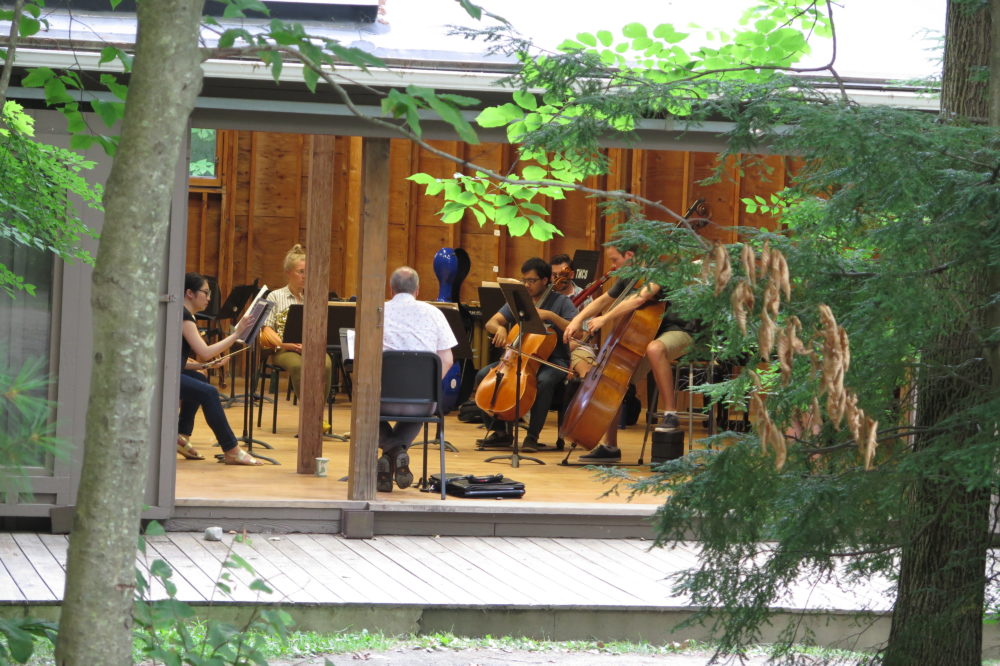
Renowned pianist Paul Lewis believes these kinds of informal exchanges are the way to go. “Gone are the days where you had these distant, sort of remote figures,” he said.
Lewis has been teaching at Tanglewood for eight years. He remembers when master classes and concerts he went to as a youth were led by intimidating performers.
“In general I think it's a good thing that we're away from [the older style of teaching] because we're dealing with music which is a very human thing,” Lewis said, “and it's something that we need to be able to share in many ways. And I think we need to be able to talk about it.”
If we don’t, he added, classical music might not have an audience in 30 years.
The pianist taught his own TLI master class this month in the sleek new Tanglewood Learning Center that’s designed to house way more than music. Visitors can also pay for TLI visual arts classes, film screenings and meet-the-maker events held in the 270-seat studio space.
There’s also a speaker series in the much larger Ozawa Hall that has included former U.S. Secretary of State Madeleine Albright.
TLI director of programming Sue Elliot curated a diverse slate of programming that spans single classes, to “Masterpasses,” to immersive weekend escapades into the life and work of artists like Georgia O’Keeffe and Richard Wagner. This way, she said, audiences can pick what they like.
“They're the ones who are choosing their own adventure,” she mused on a tour of the new facility that also has a cafe.
While it’s too early for extensive data, Elliot said so far 30% of TLI ticket buyers are engaging with the BSO for the first time. Future programming will be tweaked based in part on audience feedback about what didn’t work and what did. Hundreds of $35 to $58 seats for Ma’s master class sold out.
On stage he encouraged the audience to participate time and time again. He invited one older man with Irish dancing skills to animate the tempo in one cello suite and got a room full of people to sing long, steady notes while the students played. When they were done Ma asked a surprisingly informal question, “Is that f----in' cool or what?” (Don’t worry, he whispered the f-word.)
Sixty-eight-year-old Nick Kuvach and his friends sure thought it was.
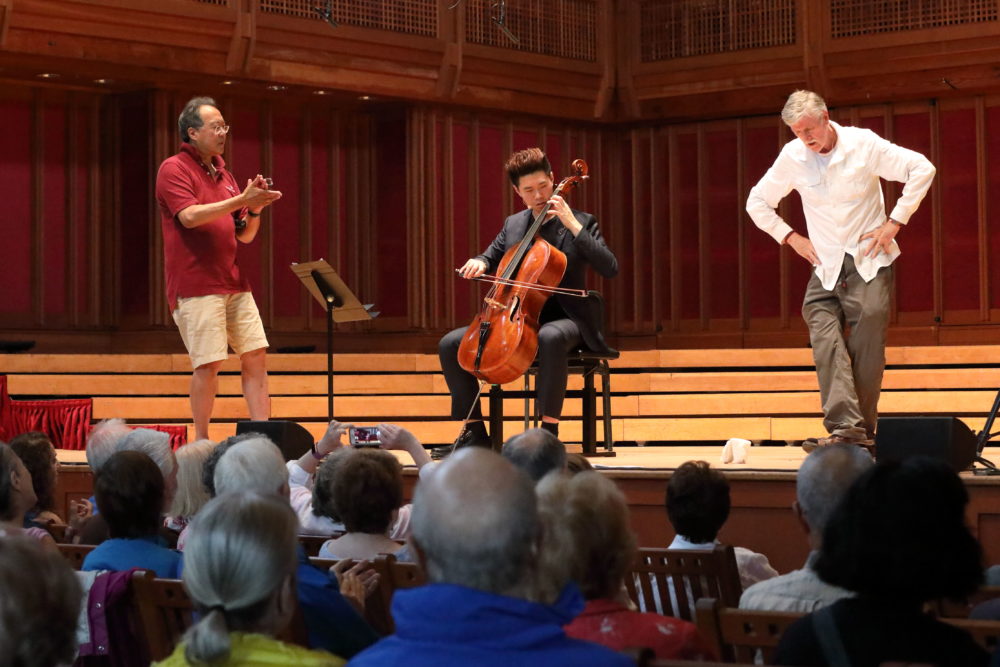
“It was like Pete Seeger conducting a masterclass through Yo-Yo Ma,” he gushed, “in terms of getting the audience to sing along, and create the beat and bring you in.”
Kuvach is a fan of Bach’s Cello Suites and usually comes to Tanglewood once a year. After this experience the Putnam County, New York, retiree said he’ll definitely to come back more often.
“Master classes are usually private and exclusive,” he said, “and to be present for a world class virtuoso is really an extraordinary thing.”
Kuvach thinks Tanglewood is on the right track with its bid to break barriers. He believes getting under the hood like this will create a more loyal audience. “A better educated audience, a more enthused audience,” he continued, adding, “Turn Tanglewood into a university! An open university.”
Even more transparency is something 20-year-old cellist Shangwen Liao would welcome. He was on stage taking the lesson with Ma, which he said was amazing. All summer Liao and his Tanglewood Music Center peers have been practicing in the learning center’s new glass-walled studios. Anyone can walk by them and peer in.
“We can see the people looking at us rehearsing,” Liao said, “and my thought was: Why don't people just walk in and see what we are doing? Of course it would be a little bit disruptive, but it would be so awesome.”
Time will tell on that idea. For now the new education program and center allow the BSO to have a more visible, year-round presence at Tanglewood for the first time.
CEO Volpe and his team have all kinds of ideas about what to program in the future, but he said they also have a lot to learn. “We're having to do things differently all the time in an ever more cluttered, complicated marketplace.”
This segment aired on August 13, 2019.
